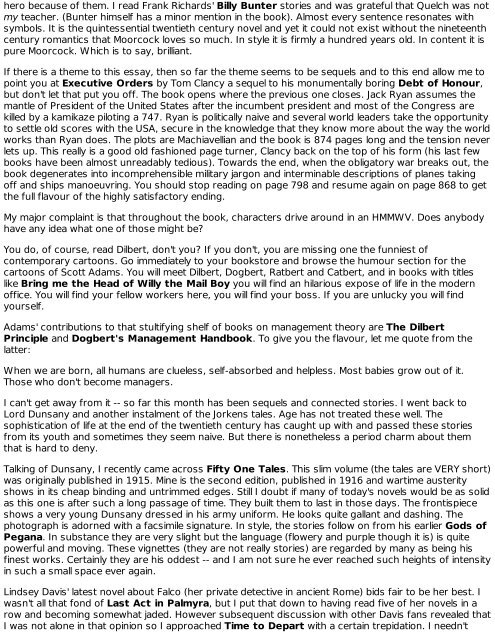Triffids Beard 2 - The Bearded Triffid
Triffids Beard 2 - The Bearded Triffid
Triffids Beard 2 - The Bearded Triffid
You also want an ePaper? Increase the reach of your titles
YUMPU automatically turns print PDFs into web optimized ePapers that Google loves.
hero because of them. I read Frank Richards' Billy Bunter stories and was grateful that Quelch was not<br />
my teacher. (Bunter himself has a minor mention in the book). Almost every sentence resonates with<br />
symbols. It is the quintessential twentieth century novel and yet it could not exist without the nineteenth<br />
century romantics that Moorcock loves so much. In style it is firmly a hundred years old. In content it is<br />
pure Moorcock. Which is to say, brilliant.<br />
If there is a theme to this essay, then so far the theme seems to be sequels and to this end allow me to<br />
point you at Executive Orders by Tom Clancy a sequel to his monumentally boring Debt of Honour,<br />
but don't let that put you off. <strong>The</strong> book opens where the previous one closes. Jack Ryan assumes the<br />
mantle of President of the United States after the incumbent president and most of the Congress are<br />
killed by a kamikaze piloting a 747. Ryan is politically naive and several world leaders take the opportunity<br />
to settle old scores with the USA, secure in the knowledge that they know more about the way the world<br />
works than Ryan does. <strong>The</strong> plots are Machiavellian and the book is 874 pages long and the tension never<br />
lets up. This really is a good old fashioned page turner, Clancy back on the top of his form (his last few<br />
books have been almost unreadably tedious). Towards the end, when the obligatory war breaks out, the<br />
book degenerates into incomprehensible military jargon and interminable descriptions of planes taking<br />
off and ships manoeuvring. You should stop reading on page 798 and resume again on page 868 to get<br />
the full flavour of the highly satisfactory ending.<br />
My major complaint is that throughout the book, characters drive around in an HMMWV. Does anybody<br />
have any idea what one of those might be?<br />
You do, of course, read Dilbert, don't you? If you don't, you are missing one the funniest of<br />
contemporary cartoons. Go immediately to your bookstore and browse the humour section for the<br />
cartoons of Scott Adams. You will meet Dilbert, Dogbert, Ratbert and Catbert, and in books with titles<br />
like Bring me the Head of Willy the Mail Boy you will find an hilarious expose of life in the modern<br />
office. You will find your fellow workers here, you will find your boss. If you are unlucky you will find<br />
yourself.<br />
Adams' contributions to that stultifying shelf of books on management theory are <strong>The</strong> Dilbert<br />
Principle and Dogbert's Management Handbook. To give you the flavour, let me quote from the<br />
latter:<br />
When we are born, all humans are clueless, self-absorbed and helpless. Most babies grow out of it.<br />
Those who don't become managers.<br />
I can't get away from it -- so far this month has been sequels and connected stories. I went back to<br />
Lord Dunsany and another instalment of the Jorkens tales. Age has not treated these well. <strong>The</strong><br />
sophistication of life at the end of the twentieth century has caught up with and passed these stories<br />
from its youth and sometimes they seem naive. But there is nonetheless a period charm about them<br />
that is hard to deny.<br />
Talking of Dunsany, I recently came across Fifty One Tales. This slim volume (the tales are VERY short)<br />
was originally published in 1915. Mine is the second edition, published in 1916 and wartime austerity<br />
shows in its cheap binding and untrimmed edges. Still I doubt if many of today's novels would be as solid<br />
as this one is after such a long passage of time. <strong>The</strong>y built them to last in those days. <strong>The</strong> frontispiece<br />
shows a very young Dunsany dressed in his army uniform. He looks quite gallant and dashing. <strong>The</strong><br />
photograph is adorned with a facsimile signature. In style, the stories follow on from his earlier Gods of<br />
Pegana. In substance they are very slight but the language (flowery and purple though it is) is quite<br />
powerful and moving. <strong>The</strong>se vignettes (they are not really stories) are regarded by many as being his<br />
finest works. Certainly they are his oddest -- and I am not sure he ever reached such heights of intensity<br />
in such a small space ever again.<br />
Lindsey Davis' latest novel about Falco (her private detective in ancient Rome) bids fair to be her best. I<br />
wasn't all that fond of Last Act in Palmyra, but I put that down to having read five of her novels in a<br />
row and becoming somewhat jaded. However subsequent discussion with other Davis fans revealed that<br />
I was not alone in that opinion so I approached Time to Depart with a certain trepidation. I needn't


